|
185 Faversham Road
Seasalter
01227 272 705
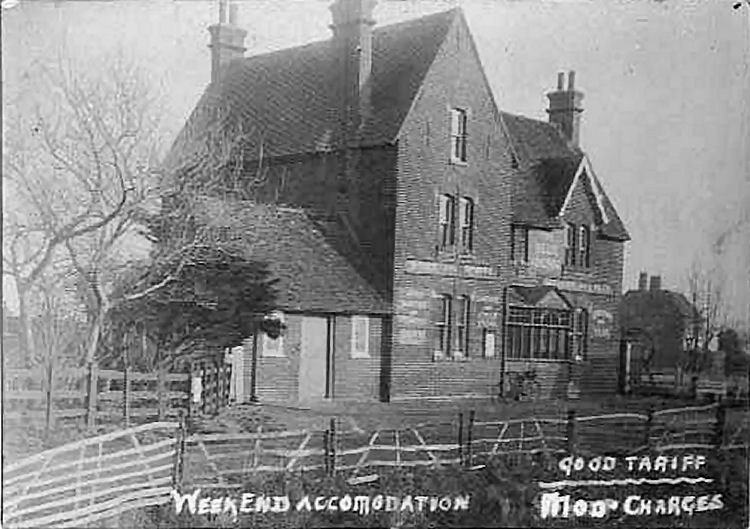
Above postcard circa 1905. |
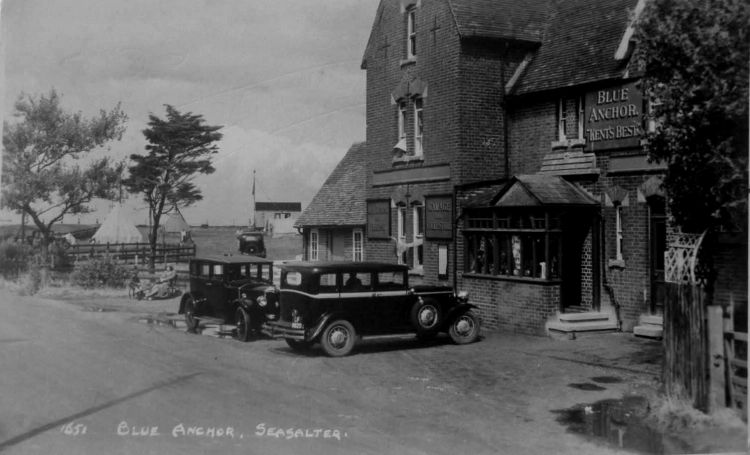
Above postcard, date unknown. |
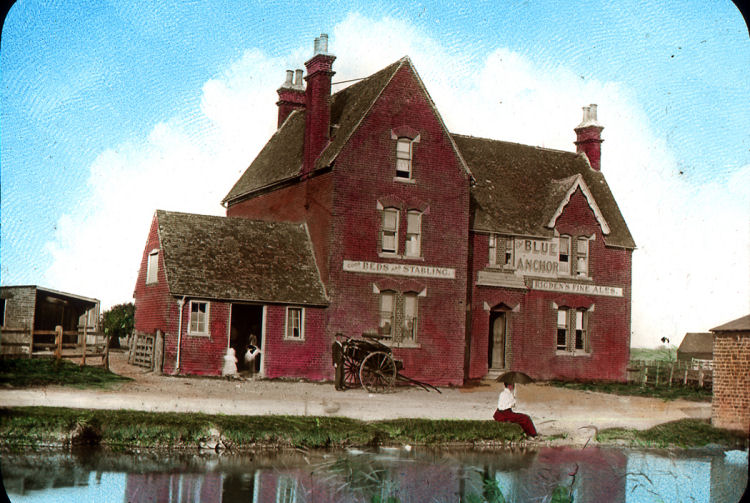
Above photo, circa 1910. Kindly sent by John Robertson. |

Above postcard, date unknown. |
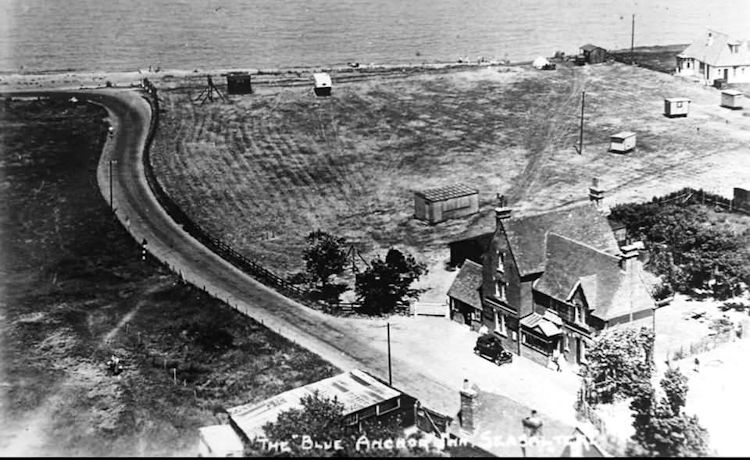
Above postcard, circa 1930. Looking towards the North-East. |
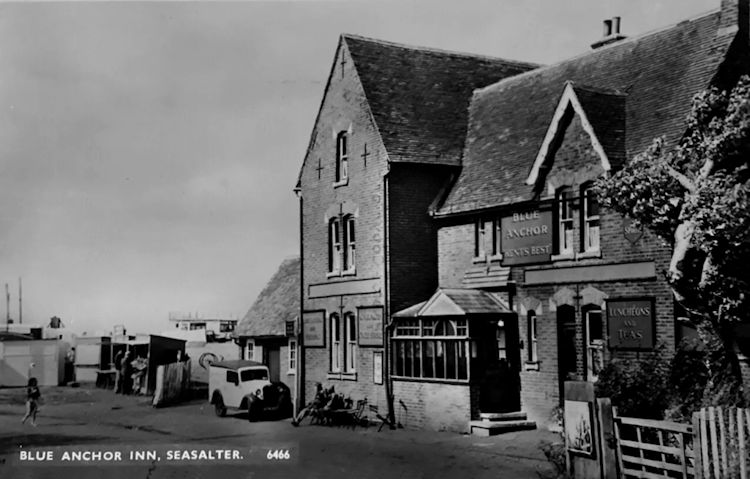
Above postcard 1936, kindly sent by Rory Kehoe. In the livery of George
Beer & Rigden's Faversham Brewery. |
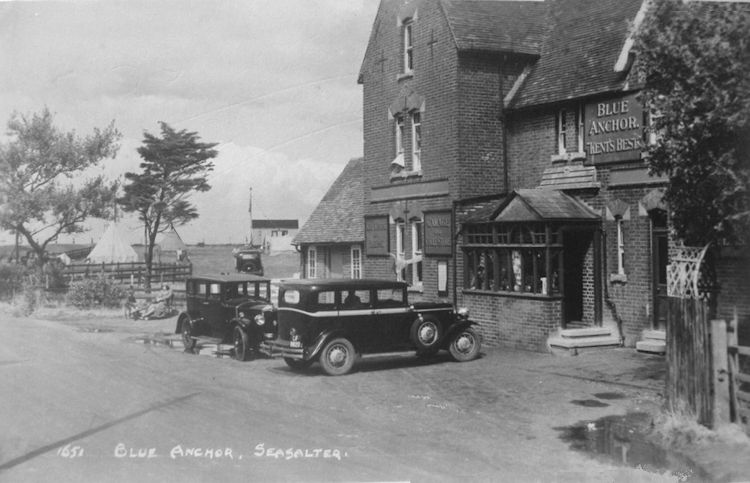
Above postcard circa 1939, kindly sent by Rory Kehoe.
The "Kent's Best" signage advertised that the pub offered beers from
George Beer & Rigden's Faversham Brewery. |
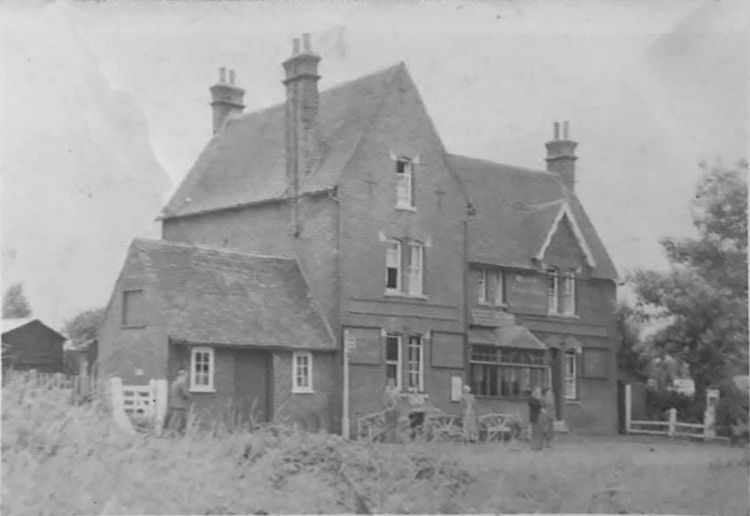
Above photo, 1949. |

Above photo, date unknown. |
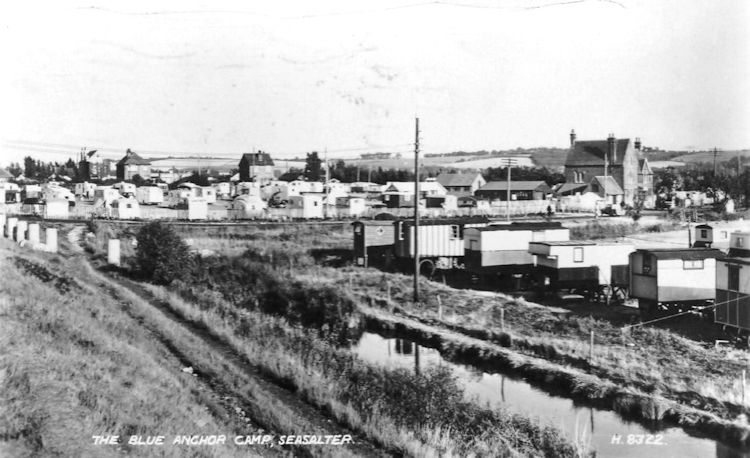
Above postcard, circa 1951. |

Above photo 2010 by Chris Whippet,
Creative Commons Licence. |
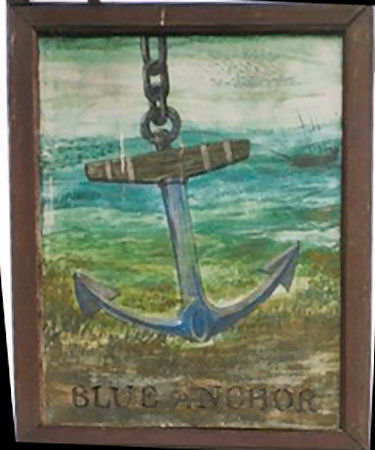
Above sign 2012. |
|
|
The method of operation of the smuggling fraternity was to land goods
close to the "Blue Anchor" pub, then ship them inland to Lenham, where heavy
carts could load up with the brandy and tobacco for onward shipment to the
major markets in London. Blue House farm was the base at the Lenham end, and
Seasalter Cross farm and Pink Farm (which benefited from cunningly-concealed
compartments, windowless rooms, and secret shafts) were both used as coastal
depots for storage.
The present "Blue Anchor" is a late Victorian building, but there was a
"Blue Anchor" here in 1756, which began as the "Crown"
in 1744. This inn, two nearby farmhouses, a couple of farm cottages, and the
ancient parsonage constituted what was known in the 19th century as 'Seasalter
Village', but most of these historic buildings had been demolished by the
1960s.
This place, now called the Blue Anchor Corner, was formerly known as
Codham's Corner, or Granny Hart's Corner, after earlier proprietors of the
"Blue Anchor Inn."
|
Canterbury Journal, Kentish Times and Farmers' Gazette, Saturday 1 June 1844.
FAVERSHAM. A Smasher.
At the office of J. G. Shepherd, Esq.. on Saturday last, Charles Smith,
a shoemaker was brought up in custody of Church, the officer
of the Ville of Dunkirk, charged with having, on the previous day,
knowingly uttered a base five-shilling piece to Mrs. Hart, landlady
of the "Anchor" public-house, Seasalter.
It appeared from her evidence that the prisoner, in company with several
others went to her house early that morning, and partook
of some refreshments, for part of which the prisoner tendered a base
crown piece. Mrs. Hart gave him 4s. 8d. in change.
In consequence of some remarks as to who had got the "change," Mrs. H.
examined the piece of coin, and found it to be a very bad
one. She immediately followed them to the "Four Horse Shoes," Graveney;
but on her arrival, the prisoner made off, as, it is
supposed, he heard her telling Mrs. Gibbs, the landlady, of the affair.
Mrs. Gibbs stated that he was the same man who had offered her a bad
sixpence. The prisoner was apprehended the following
morning by Church, he was fully committed for trial at the ensuing
quarter sessions.
|
|
From the Kentish Gazette, 4 June 1844.
A Smasher.
At the office of J. G. Shepherd, Esq., Faversham, on Saturday week,
Charles Smith, a shoemaker, was brought up in custody of Church, the
active officer of Dunkirk, charged with knowingly uttering a base five
shilling piece on the previous day to Mrs. Hart, landlady of the
“Anchor” public-house, Seasalter.
From her evidence it appeared that the prisoner with several others went
into her house that morning, when the prisoner called for a pot of beer,
and tendered the base coin in payment. Soon after he left, information
was communicated to Church, who apprehended the prisoner at the “Three
Tons” public-house, Faversham. Giles Milton, Esq. fully committed him to
take his trial at the next Quarter Sessions. The prisoner urged nothing
in his defence. Several witnesses proved both the prisoner ant his
accomplices had tried to pass various other coins at Whitstable and its
vicinity.
|
|
South Eastern Gazette, 2 October, 1860.
Suicide by Hanging.
On Saturday afternoon last, the deputy coroner for the district, C.
J. Fox, Esq., held an inquiry at the "Blue Anchor," touching the
circumstances connected with the death of Richard Hills, a labourer,
who committed self-destruction by hanging himself in a lodge on the
farm of his employer, on the previous morning.
John Chaplin Hills, farmer and grazier, deposed that on Friday
morning, at about twenty minutes past six, he went to his farm-yard
to milk his cows, and had occasion to go into a lodge, where he saw
the deceased hanging by his neck to one of the pulleys used when
beasts were slaughtered. He was quite dead and cold, and from his
body being so very stiff, witness believed that he had been hanging
for several hours. He called assistance, and the deceased was cut
down. The deceased had been for several years very intemperate in
his habits, and he (witness) had no doubt that that circumstance,
coupled with his being considerably in debt, caused him to commit
suicide. The last time witness saw the deceased alive was on
Thursday evening at about seven o’clock, and he was then at the
"Blue Anchor," but he did not observe anything in his manner. The
deceased was 38 years of age.
William Friend, publican, of Seasalter,
(possibly "Jolly Sailor") who was called by the last
witness to his farm at half-past six o’clock on the previous
morning, gave corroborative evidence.
Thomas Austen, labourer, in the employ of Mr. John C. Hills,,
deposed that on Thursday afternoon he was working with the deceased,
when the latter said he had a good deal on his mind, and that his
head troubled him more than he could bear. Witness asked what his
trouble was, but he refused to tell him, and said that was best
known to himself. Witness saw him in the evening at the
public-house, and told him, by his master’s orders, to go and turn
the cattle into the fields. About an hour afterwards the deceased
left the public-house, as he believed, to go to the farm. He did not
see him alive afterwards.
Verdict "Temporary insanity."
|
|
From the Kentish Chronicle, 11 April, 1863.
A PUBLIC HOUSE WITH A BAD CHARACTER.
Henry Hart, licensed victualler, of Seasalter, was charged with opening
his house for the sale of beer before the hour of half-past 12, on the
previous Sunday morning. Defendant said there was a pint of beer drawn
to a lodger, but the clerk informed him that his license did not allow
him to draw beer for a lodger in the morning. P.C. Hoad stated that he
placed himself in concealment on the previous Sunday morning, for the
purpose or watching the defendant's house, by direction of his
superintendent. At 10 o'clock a man named Hocklen, the two Woods, and
other drunken characters, went round to the back of the house, where
they remained some time. The son of the defendant was out in the road,
as if watching, so that he (the constable) could not follow them without
being seen by him. After they had gone others went round to the back of
the house, and remained there three quarters of an hour. At the least,
12 or 16 persons went there between 10 and 12 o'clock, but he (the
constable) could not say whether they went inside or not. When he got a chance, he went round to the back of the house, when he
saw the daughter watching through the window. On going into the house,
he caught the daughter going from the tap room with a pot containing
beer, which she said she had drawn for a lodger. In the tap room he
found a man named Carter, a very drunken character; he had been there
about an hour, and there were five other men besides, but no beer. The
men left the house smoking, and some of them the worse for liquor. Supt. Walker said he had had a great deal of trouble with this house—it
was a perfect nuisance, and all the drunken characters from Whitstable
were in the habit of going up there on Sundays. Fined £1, costs 8s. Defendant's wife expressed an earnest wish that the
magistrates “would just come down and see the house themselves,” but
they did not seem inclined to accept the invitation, so the money was
paid and the defendant and his spouse retired. |
|
From the Kentish Gazette, 13 June 1865.
St. Augustine's Petty sessions. Saturday. (Before Wm. Delmar,
Esq., Wm. Plummer, Esq., Captain Starke, G. T. Tomlin, Esq., T. G.
Peckham, Esq., and Peter Marten, Esq.)
Charge against a Publican.
Henry Hart, landlord of the "Blue Anchor," Seasalter, was charged
with having his house open for the sale of liquor at 10.45 a.m. on
Sunday the 4th instant. Police-constables Hoad and Hall proved that
they saw a number of men in the tap-room, and that a quart pot with
ale in it and a glass stood upon the table.
Mr. Fielding, who appeared tor the defendant, called witnesses to
prove that the men had gone to buy fish of the landlord. They asked
for ale, but the landlady refused to serve them. A lodger in the
house afterwards got them ome ale unknown to the landlord or
landlady.
As there appeared to be some doubt about the matter, the
Magistrates dismissed the case.
|
|
Canterbury Journal, Kentish Times and Farmers' Gazette 13 July 1907.
LICENSING TRANSFER.
The transfer of the licence of the "Jolly Sailor,"
Whitstable-cum-Seasalter, from "George Shrubsole to John Frederick W.
Hossback, was confirmed by the Magistrates at the St. Augustine's Petty
Sessions, Canterbury, on Saturday.
|
|
From the Canterbury Journal, Kentish Times and Farmers' Gazette, 12 November, 1910.
NO EXCUSE FOR HIS CONDUCT.
WHITSTABLE MAN SENT TO PRISON FOR THREE MONTHS.
Herbert Waters, a mariner, of Middle Wall, Whitstable, was charged at
St. Augustine's Petty Sessions at Canterbury on Saturday, with having
between 31st December, 1909, and 17th March, 1910, he then being the
bailee of certain chattels, stolen two pairs of fishing waders, two
pairs of boots, two gallons of varnish. two gallons of linseed oil, and
30lbs. of lead paint, valued at between £4 and £5, the property of
Charles William Marshall.
Prosecutor, a draper of Faversham, and a boat owner of Whitstable,
stated that from time to time he had employed prisoner to assist him
when he had gone fishing at Whitstable. He kept fishing tackle and other
effects at "Wavecrest" for that purpose. His house. "Wavecrest," had
been unoccupied during the winter, and the articles mentioned in the
charge were kept in a store at the rear of the premises. Prosecutor had
five boats at Whitstable, and prisoner could go to the store and use
anything there required for the boats, but had no right to use it for
any other purpose. About March of this year prosecutor went to the store
and found the varnish, oil and paint missing, and therefore informed the
police. He had since seen those goods, and identified them as his
property. In October, 1909, he entrusted to prisoner two pairs of Scotch
waders and two pairs of boots, and he now identified two pairs of waders
as his, property. He valued the whole at between £4 and £5.
Nellie Knapp, daughter of William Richard Knapp, stated that in the
early part of this year she was living at Whitstable. Prisoner asked her
to sell a pair of waders for him, telling her to take them to Mrs.
Friend’s, but, not to put them in his name. Mrs. Friend bought them for
2s., and she also gave the owner’s name as that of Allen. Prisoner’s
daughter went with her and witness gave her the money.
Alice Friend, wife of Frederick Friend, second-hand dealer, of 43,
Harbour Street, Whitstable, stated that on February 18th witness brought
in a pair of waders, which she purchased for 2s. in the name of Allen.
William Hook, labourer, of Inland Wall, Whitstable, stated that about
February 8th prisoner asked him if he would buy 2s. 6d. worth of paint
or oil. Witness first said he had no use for it, but prisoner replied
that witness would get good value, and it would do him (Waters) a good
turn. He eventually bought the paint and oil for 2s. 6d., and prisoner
took him to the store at the rear of "Wavecrest" where it was poured out
of a large drum.
Arthur Dadd, boatman, of Waterloo Road, Whitstable, stated that on
February 28th prisoner came to his house and said he had bought some
varnish cheap, and asked witness to buy a quart. Witness did so, paying
1s. 6d. for it.
Nathaniel Keen stated that in February last prisoner stopped him on his
way home from work and asked if he wanted to buy some varnish, saying he
had more than he should
want. Prisoner brought a gallon to his house, and he gave 3s. for it.
Prisoner remarked that "now he could go home and buy food for his
children."
Police-Sergeant Thomas stated that on receipt of information of the
missing articles he made enquiries, which led him to interview all the
previous witnesses, and also William Dorrington, licensee of the "Blue Anchor," Whitstable, with the result that the articles were recovered
with the exception of the two pairs of boots. When charged with the
theft, prisoner said. "Is that all?"
William Dorrington, landlord of the "Blue Anchor," Whitstable, stated
that he knew the prisoner. He came to his house about the first week in
January last and he brought with him some brown boots and a pair of
fishing waders which he lent to some gentlemen who were staving at his
(witness) house in order that they might go fishing and duck shooting.
After they were done with them the boots and waders were left at
witness’s house. A little later in the month prisoner asked witness to
lend him some money as his daughter had died at Bromley. Witness let him
have 10s., and prisoner said he could keep the waders as security. The
boots and waders had been in witness's house ever since.
Prisoner pleaded guilty and said he was very sorry for what he had done.
He sold the things in order to buy food for his children. He had a very
bad winter. He intended to repay the money and get the things back for
Mr. Marshall before the summer came on. He sent £26 home to pay for the
things, but he found the money had not been paid over for the
goods, and his son-in-law never went to Mr. Marshall to tell him where
the things were.
Superintendent Heard said after committing the offence the prisoner
absconded and from March to November had been at Shoeburyness where he
was arrested. The prisoner had a wife and family at Whitstable and
therefore the money he sent home might have been for their maintenance.
About twenty years ago the prisoner was fined £10 for stealing, as the
bailee, a boat.
The Chairman (Mr. F. H. Wilbee) said the prisoner had pleaded guilty to
the charge and there was not the slightest doubt that was the best thing
he could have done under the circumstances. He had been the temporary
holder of certain property entrusted to him and he had not appreciated
the confidence placed in him. There was not a shadow of excuse for the
prisoner. He had had a good master who had treated him too well. The
prisoner had committed a breach of trust and he would have to go to
prison for three months hard labour.
|
|
Whitstable Times and Herne Bay Herald 19 November 1910.
SPECIAL NOTICE, W. DORRINGTON.
Of the "Blue Anchor," Seasalter.
Begs to Thank his many Friends (both old and new) for past patronage,
and to inform them that he is taking over the "Pearson's Arms,"
Whitstable, on December 6th. Next, where he will be pleased to see them
after 6 p.m.
Don't forget to drop in as there will always be a snack on hand. Tea and
Coffee after 6 a.m., and as usual everything of the best. All
proprietary brands will be stocked.
Ash and Co.'s Fine Ales A Speciality.
|
|
Whitstable Times and Herne Bay Herald 14 June 1919.
WANTED.
Housemaid-Waitress; good wages.
Apply Mrs. Robinson, "Blue Anchor," Seasalter.
|
|
Whitstable Times and Herne Bay Herald 22 December 1923.
The Annual Shoot Will take place at the "Blue Anchor," Seasalter, on
December 26th.
Shooting commences at 11 o'clock sharp. Good Prizes.
Proprietor: Nat Phelps.
|
|
Whitstable Times and Herne Bay Herald 16 January 1926.
THE BLUE ANCHOR, SEASALTER.
'Phone Whitstable 6202
Under entirely New Management.
Proprietor - A. A. NEWCOMBE. All Proprietary Spirits and Wines.
Messrs. Beer & Rigden's "Kent's Best" Ales, Etc.
Board Residence. Luncheons. Teas.
Large Club Room Available.
|
|
Whitstable Times and Herne Bay Herald 16 February 1935.
DISTRICT COUNCIL. "JOLLY SAILOR" Corner.
Your Committee has appointed Councillor Watts to interview Messrs.
Fremlins, Ltd., the owners of the "Jolly Sailor Inn," Seasalter, and
place before them the suggestion that the premises should be demolished
and re-erected on another site, in order that the Council may carry out
the improvement of widening the corner.
|
|
Whitstable Times and Herne Bay Herald 17 April 1943.
MENTIONED IN DISPATCHES.
Mr. Alan A. Newcombe, "Blue Anchor," Seasalter has received the
following letter:-
I am commanded by my Lords Commissioners of the Admiralty to inform you
that they have learned with great pleasure that on the recommendation of
the First Lord, the King has approved the award to you of a mention in
dispatches for good services in M. V. Hindustan, in action with the
enemy.
|
|
Whitstable Times and Herne Bay Herald 06 January 1945.
To Patrons of the "Blue Anchor Cafe" (adjoining the "Blue Anchor Hotel,"
Seasalter.) The above will be closed from the 1st of January to the 1st
April to enable repairs and extensions to be carried out.
|
|
Whitstable Times and Herne Bay Herald, Saturday 13 September 1952.
Whitstable Driver Did Not Stop After Accident.
DID NOT THINK IT SERIOUS ENOUGH.
For failing to stop after an accident at Whitstable, on July 21st, and
for failing to report the accident within 24 hours, Frank Richard
Rossiter, 31, Belmont Road, Whitstable, a machinist working in a garage,
was fined a total of £3 and ordered to pay costs of £2 10s. by the St.
Augustine’s Magistrates on Wednesday.
Rossiter, a married man with two children, pleaded not guilty to the
first summons, of failing to stop, and guilty to the second.
The driver of another car, with which Rossiter's car came into
collision. Mr. Reginald Charles Rivers, of Gasworks House, Bletchley,
Bucks, described how at about 6.10 p.m., on Monday, July 21st. he was
driving between the "Sportsman" and the "Blue Anchor" at Seasalter,
towards Whitstable.
When he was near the Seasalter Stores he saw two pedestrians walking in
the road. He decided to overtake them, put out his right hand and pulled
out to the centre of the road. He was just pulling back to his near side
when he felt "a tidy bump behind."
"I had to stop," said Mr. Rivers, "because my mudguard was jammed into
my tyre. As the other vehicle passed me I shouted to the driver but it
drew away and went out of sight. I am sure the driver saw me."
Mr. Rivers took the number of the car and reported the accident to P.C.
Taylor at Whitstable Police Station. He told the magistrates that his
off-side rear wheel was smashed.
P.C. Taylor saw Rossiter at his home on August 3rd and asked him about
the accident. Rossiter replied, yes, he was involved in an accident on
July 21st.
Giving evidence Rossiter said that as he was passing the other car he
suddenly saw the two pedestrians. Not wanting to go into the pond on the
other side of the road, "as I knew I would never get out again," he
pulled back and just slightly hit the other car.
"I did not report the accident," said the defendant, "because I did not
think it was at all serious." He had been driving for 23 years without
an accident.
|
|
Whitstable Times and Herne Bay Herald, Saturday 11 April 1953.
"A Most Trivial Offence," Solicitor Tells Magistrates.
Absolute Discharge For Whitstable Butcher.
"Probably the most trivial technical offence that has ever wasted the
time of this court" was how defending solicitor Mr. Elliot Allard
described a Ministry of Food summons against a Whitstable butcher at at
Augustine's Magistrates' Court on Wednesday of last week.
A complaint by Miss Winifred Campbell, that she had been overcharged 3d
for 1 1/2 lbs of minced beef brought, before the magistrates. James
Thomas Martin senr. of the "Blue Anchor Inn," Seasalter, owner of
Messrs. Duffy's butchers shop, 41, Harbour Street.
With the manager of the shop, Josepn Harold White, of 16, Sydney Road,
Whitstable— accused of aiding and abbetting— he was absoluteiy
discharged on payment, shared between the defendants, of £2 12s. 6d.
costs.
Mr. P. A. G. Aldington, prosecuting for the Ministry, said that the
offence took place on January 28th when Miss Campbell was served by
White with 14 lbs. of meat. She was charged 3s 3d. while the controlled
price was 2s. a pound.
Miss Campbell, of 62, North-wood Road, Whitstable, said, that she paid
the 3sa. 3d. because she thought the meat might be slightly over weight.
Eventually she handed the meat over to the Ministry of Food.
NOT THE FIRST TIME.
She was asked by Mr. Allard: "It was not the first time was it, that you
had reported Messrs. Duffy?”
When Miss Campbell replied that it was. Mr. Allard said that he had been
instructed that there had been a similar occurrence when she had been
under-charged 1/2d.
Questioning the witness further, Mr. Allard said: "Would it not be
reasonable that Mr. White, knowing your position in the town, might have
thought that you would like something better than ordinary mince—steak
mince for instance?"
Miss Campbell answered: "Not necessarily."
Asked whether she had caused Mr. Martin, jnr. to be telephoned so that
he could be invited to a cafe to discuss the matter. Miss Campbell said
that was so, but it was only because she and her family wanted the
matter settled "nicely without any trouble."
Miss Campbell added that it was the way White spoke on the telephone,
when he took the receiver from Mr. Martin jnr. which made her family
decide to make the complaint official.
"QUITE NICELY."
Denying that she was still negotiating with Martin after the official
complaint had been made. Miss Campbell said: "Our object was to meet him
in the cafe and put to him quite nicely "That we did not like being
overcharged for our meat."
Henry George Pittock, Ministry of Food Enforcement inspector, said that
he visited the shop on the following day. He interviewed White and told
him that a complaint had been made alleging that he had overcharged a
customer.
In a statement, he said that the meat in question was chuck and blade
brace steak for which he thought he was permitted to charge up to 2s.
6d. a lb.
Later, witness said, he called Upon Martin at the "Blue Anchor" and told
him of statements that he had taken from Miss Campbell and White. Martin
said that he owned the business but handled none of the management. He
knew nothing of the over-charge.
Cross-examined, witness agreed that when he weighed the steak at the
shop, it was 1 oz. over weight and said that although he was not an
expert he imagined that allowing for evaporation the meat was probably
even more over-weight at the time that it was purchased.
Asked if he thought this one of the regulations which considerably added
to the difficulties of all butchers, he said: "I think I must agree."
MACHINE IN COURT.
At this point, on the instructions of Mr. Allard, White brought in the
mincing machine. The solicitors' table swayed under its weight. In
evidence White said that a butcher had to put in 2lb. of meat to get
1lb. of mince.
In mitigation Mr. Allard said: "It seems to me impossible for butchers
to keep within the scope of existing meat regulations."
The regulations which covered mince meat stated that meat from anywhere
should be charged at the same price. In Mr. Allard's opinion that
encouraged butchers to use only inferior grades of meat for mince.
He continued: "It is a trivial regulation. If we look outside the court
at our cars, we will see that half of us have illicit number plates.
This is probably the most trivial technical offence that has ever wasted
the time of this court."
|
|
Whitstable Times and Herne Bay Herald, Saturday 6 March 1954.
PLAN TO "LOWER" ROAD. COUNTY COUNCIL'S VIEWS MAY BE SOUGHT.
At their meeting next Tuesday, Whitstable Council will be asked to seek the
views of the Kent County Council on the proposal to lower the surface of the
road under the railway bridge near the "Blue Anchor", at Seasalter, to
enable double-decker buses to pass under the bridge.
The Surveyor (Mr. G. S. Dunkin) has told the Council’s Highways and Public
Works Committee that it is possible to drain the road into the existing
drainage dykes if the road is lowered by three feet.
He also reported that the Transport Commission would require Whitstable
Council, at their own expense, to make trial holes to ascertain the depth
and condition of the bridge walls, and submitted his views upon that
suggestion.
|
|
From the
http://www.kentonline.co.uk 1 March 2010.
Woman almost blinded after being glassed outside Seasalter's Blue Anchor pub.
A woman needed emergency surgery to save her sight after a vicious
attack in a pub car park.
The 24-year-old was almost blinded in one eye after she was glassed
in the face at the "Blue Anchor" in Seasalter.
She had been sitting in her car when a woman started damaging her
wing mirror.
When she got out of the car to confront the woman she was attacked
with a broken glass.
She was taken to hospital and needed emergency surgery to remove
glass from her eye.
Police say she may still lose the sight in her injured eye.
Anyone who witnessed the attack - which happened at around 2am on
Sunday, February 21 - is urged to call police on 01227 868296 or Kent
Crimestoppers, anonymously, on 0800 555111. |
I am informed that the pub changed name to the "Oyster
Pearl" some time around 2014.
LICENSEE LIST
HEART William 1801-28+

HART Mary 1844-51+ (age 79 in 1851 ) )
HART Henry Hart 1861-65+ (also Shepherd age 58 in 1861 ) )
WRAIGHT William 1871-91+ (also wheelwright age 49 in 1891 ) )
EMMERTON Thomas James 1901-Sept/1902 (age 43 in 1901 ) )

HODGMAN William Sept/1902-03+
 
SHRUBSOLE George to July/1907
HOSSBACK John Frederick W July/1907+
DORRINGTON William
 to Nov/1910
to Nov/1910
HOBDAY Charles 1911+ (Police Pensioner age 54 in 1911 ) )
GILBERT Alfred 1918+
ROBINSON Mrs 1919+
PHELPS Nathaniel 1922-24+

NEWCOMBE Alfred Arthur 1926-43+

MARTIN Thomas sen 1953+
https://pubwiki.co.uk/BlueAnchor.shtml
 From the Pigot's Directory 1828-29 From the Pigot's Directory 1828-29
 From the Kelly's Directory 1903 From the Kelly's Directory 1903
 From the Kelly's Directory 1924 From the Kelly's Directory 1924
 Census Census
 Whitstable Times
and Herne Bay Herald Whitstable Times
and Herne Bay Herald
|











